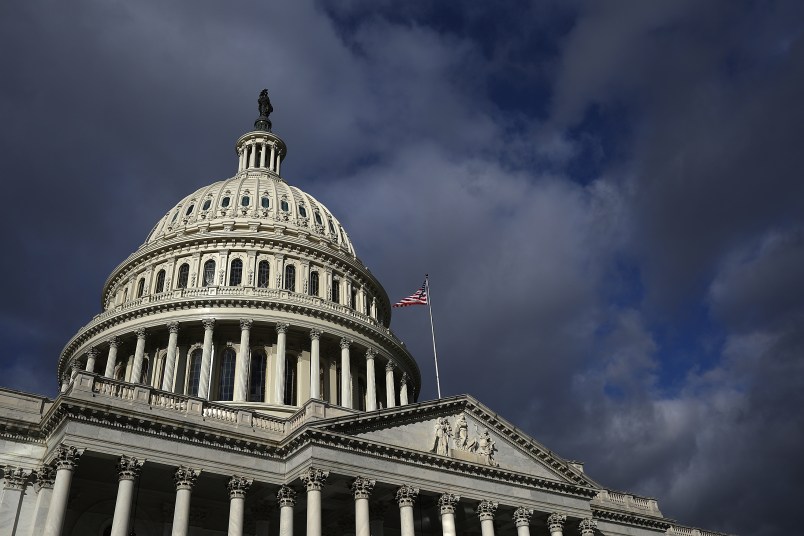WASHINGTON (AP) — The era of trillion-dollar budget deficits is about to make a comeback — and a brewing budget deal could mean their return comes just next year.
Talks on a budget-busting spending pact that would give whopping increases to both the Pentagon and domestic programs have been inching closer to an agreement, aides and lawmakers said.
GOP defense hawks are prevailing over the party’s depleted ranks of deficit hawks while Democrats leverage their influence to increase spending for domestic priorities such as combating opioid misuse.
Details are closely held and subject to change. But at issue is a two-year deal to increase crunching caps on spending set by a failed 2011 budget deal. Republicans have pushed for defense increases in the neighborhood of $80 billion a year and have offered Democrats nearly as much — $60 billion or so per year — for nondefense programs.
Add in $80 billion to $90 billion worth of hurricane aid for Texas, Florida and Puerto Rico, health care funding and money for President Donald Trump’s border security plan, and the final tally could total close to $400 billion. The potential cost, over the 2018-19 budget years, would rival the deficit impact of last year’s tax measure over that period.
“Republicans for years have made all of these bold promises to rein in spending,” said Brian Riedl, a budget analyst at the conservative Manhattan Institute. “And they’re doing the opposite.”
The negotiations are bipartisan since it takes votes from Democrats to lift the budget caps and advance a follow-up omnibus spending bill, whose overall cost is likely to exceed $1.2 trillion. That means domestic programs get their due, despite the opposition of conservatives.
“Right now, everything I’m hearing grows the size of government at 13 percent,” said Rep. Mark Meadows, R-N.C., citing back-and-forth budget offers. “And that’s a nonstarter for conservatives.”
Still, Republican deficit hawks stepped aside during last year’s tax debate, and it’s not looking like they’ll mount a stand now. Instead, GOP defense hawks worried about lagging readiness, training and weapons procurement are carrying the day, even if it means placating Democrats with spending elsewhere.
“This budget dysfunction has a human cost, and our military is bearing the brunt of it,” said Mac Thornberry, chairman of the House Armed Services Committee, citing a spate of casualties from training accidents last year.
The potential agreement would significantly exceed Trump’s request for a $54 billion increase in defense spending — to $603 billion before adding war funds — above the current cap. Thornberry, R-Texas, said negotiators are “very close to a budget agreement.”
The budget talks are closely held and occurring as lawmakers struggle to sort through a solution to protect younger immigrants soon to be at risk of deportation with Trump’s elimination of the Deferred Action for Childhood Arrivals program, called DACA, established by President Barack Obama. House Minority Leader Nancy Pelosi, D-Calif., has linked progress on the budget with action to address DACA, but other Democrats are beginning to agitate for delinking the two, lest the opportunity for a budget pact be lost.
A trade of offers on Thursday represented progress, aides said, but an agreement didn’t appear imminent. The aides, both Democrats and Republicans, spoke on condition of anonymity because the talks are secretive.
The budget caps are the hangover from the 2011 Budget Control Act, negotiated between Republicans and Obama, that prevented a default on the national debt and established a deficit-cutting supercommittee. But the failure of the supercommittee left behind unrealistic automatic spending cuts, known as sequestration, and today’s stringent spending caps.
Deals in 2013 and 2015 eased the effects of sequestration by replacing cuts to domestic agency operating budgets and the Pentagon with spending cuts and fee increases elsewhere in the budget. Those offsetting measures tended to be relatively pain-free, though.
This year’s looming deal is too big, however, to be fully offset with easy cuts elsewhere so Capitol Hill leaders would simply be adding much of its costs straight to the $20.6 trillion national debt.
In the wake of last year’s tax bill, the Congressional Budget Office says the deficit for 2018 will hit about $700 billion — before any fresh increase. Next year’s deficit is already estimated to reach $975 billion, so the brewing agreement would mean the first $1 trillion-plus deficit since Obama’s first term.
House Budget Committee Chairman Steve Womack, R-Ark., told reporters at a GOP retreat that he is considering abandoning the chamber’s traditional pursuit of a budget resolution this year. Under Capitol Hill’s arcane rules, the annual budget resolution is a nonbinding measure that lays out priorities on spending, taxes and deficits. But it takes follow-up legislation to implement these priorities.
Womack said he might instead focus his efforts on unspecified changes to Washington’s budget process. He said any House budget measure “certainly will not have a force of law and, No. 2, is not ever going to see the light of day.”







Just what is new, REPUG have always done the opposite of their rhetoric.
Great!
What could possibly go wrong?
Repubs were against deficit spending before they were for it.
These are the same BORROW AND SPEND RED INK Republicans who whine about Tax and Spend Democrats.
You had Red Ink Ronnie triple the National Debt, Old Man Bush doubled it, Dumbya outdid both of them in the Red Ink.
Clinton balanced the budget, and Rush Limbaugh roasted him for doing that saying that he was taking too much money away from working people.
Obama cut the red ink down yet all you heard from FAUX AND FIENDS were lies that he ran out of control deficits.
I got a feeling the rest of the world is getting sick and tired of our irresponsibility and they will show it by dumping the dollar as the world’s reserve currency, dumping American stocks and Treasury notes.